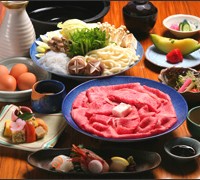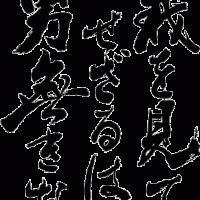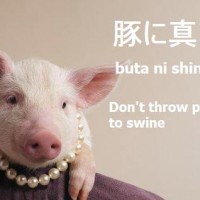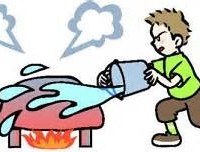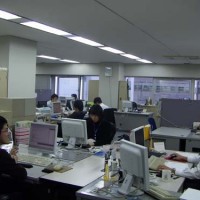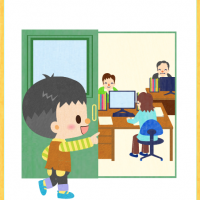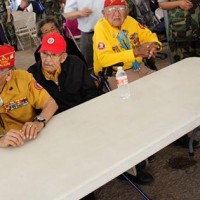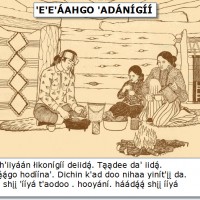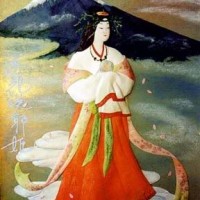Monthly Archives: July 2015
Thursday: Japanese Food (日本の食べ物)
07/31/2015 blog
Sukiyaki (すきやき) (Sukiyaki Professionally Served) Like Shabu Shabu (しゃぶしゃぶ), Sukiyaki (NOT a song!) is one of the Japanese popular “Nabe (served in a pot to be shared by several people)” dishes (https://en.wikipedia.org/wiki/Sukiyaki). “Suki” means “favorite” while “yaki” is the way of cooking – “fried.” Depending on where you live, the ingredient will change. But the most important ingredient in Sukiyaki dish is “high quality thinly sliced beef.” (High quality thinly sliced beef – “A MUST” in Sukiyaki) (Example of Ingredients) (Cooked in Special Sauce) (Dip in Raw Egg) (Enjoyed Like This)
Wednesday: Nihon-no Manga (日本の漫画)
07/29/2015 blog
Cyborg Zero Zero Nain (サイボーグ009) (Record Jacket) At first, Shotaro Ishi-no-mori (Ishimori) produced this SF cartoon in early 1960 in Weekly Shonen King. A cartoon of this kind was very unique in those days, so it turned into TV series and movies, which became so popular especially among boys. Ishinomori made a new cartoon trend with Cyborg 009 along with Kamen Rider (Masked Rider) which would show up on TV later on. Both boys and girls, including me (!), loved these TV shows. Please refer to the link below so your knowledge about this Japanese cartoon will expand! https://en.wikipedia.org/wiki/Cyborg_009
Tuesday: Nihon-no Kotowaza
07/29/2015 blog
Gi-wo Mite Sezaru-wa Yuunaki Nari (義を見てせざるは勇なきなり) (The Proverb Written by A Professional Calligrapher) [Vocaburary] Gi (義・ぎ): what is ethically right Mite (見て・みて) > Miru (見る・みる): look; watch Sezaru (せざる): do not do Yuu (勇・ゆう): courage Naki (無き・なき) > Nashi (無し・なし): lack Nari (なり): affirmative ending [Translation] To see what is right and not to do it is a want of courage./ Knowing what is right without practicing it betrays one’s cowardice. [Comment] In traditional Japanese society, “Gi” is one of the virtues of decent human beings. Accordingly, you were regarded as a coward (big shame!) if you didn’t stood up for what you believed was ethically right. (Gi)
Tuesday: Nihon-no Kotowaza
07/28/2015 blog
Buta-ni Shinju (豚に真珠) [Vocaburary] Buta (豚・ブタ): a pig; a hog; swine Shinju (真珠・しんじゅ): pearls [Usage] Don’t throw/cast pearls before swine. [Translation] Give nothing precious to those who don’t understand its value. [Comment] “Neko-ni Koban” (equivalent to “Buta-ni Shinju”): Neko – Cats; Koban – Gold No mercy on those who never appreciate whatever given.
Tuesday: Nihon-no Kotowaza
07/28/2015 blog
Yakeishi-ni Mizu (焼け石に水) (the image of the proverb/expression) [Vocaburary] Yakeishi (焼け石・やけいし): a hot stone; a heated stone Mizu (水・みず): water [Usages] It would be like throwing water on thirsty soil. It will be far short of meeting the requirement. [Comment] Do you figure out what is going on in the picture above? A boy is throwing a bucket of water to cool down the scorching hot stone table (or something?). Do you think it will work? I’d say few people think that will. So, what this boy is doing is “Yakeishi-ni Mizu.” Here is another example. You own a business which you have started just recently. You need to hire …
Tuesday: Nihon-no Kotowaza
07/28/2015 blog
Taigi-wa Taigo-no Moto (大疑は大悟の基) (Great Doubt) [Vocaburary] Taigi (大疑・たいぎ): Great Doubt – having a big doubt Taigo (大悟・たいご): Great Enlightenment – getting enlightened/realizing something very important Moto (基・もと): Basis [Translation] Great doubt is the beginning of great enlightenment. [Comment] You are encouraged to have a big doubt about something that seems important. Keep working on that until what you have thought about becomes crystal clear to you. That is the moment when you are really enlightened to the next level.
Monday: One Point Nihongo Clinic
07/28/2015 blog
Shirtsureishimasu (しつれいします) <2> Traditionally, the Japanese believe that you cannot go home before your boss. Simply it is rude for you to do so. However, if you dare to say, “Shitsureishimasu (しつれいします)” and take off, you can unless you signed the contract, which says that you will stay until you get your job done. (Overtime, unless you get paid extra for the work, is not welcome.) In this case, “Shitsureishimasu” means “I am sorry to DISTURB or BOTHER you by going home when you can’t.” Mostly, “Shitsureishimasu” follows the word, “Osakini,” which means “before you (go home).” Especially, it is your boss or your supervisor that is left behind working, rookies are …
Monday: One Point Nihongo Clinic
07/28/2015 blog
Shirtsureishimasu (しつれいします) <1> (You say, “Shitsureishimasu” before entering a Teachers’ Room in Japan.) Every school in Japan has a “Teachers’ Room” called “Shokuin Shitsu (しょくいんしつ). This is NOT equivalent to “Teachers’ Lounge” in US. Teachers’ lounges are where teachers take a break as you know it. On the contrary, Japanese “Shokuin Shitsu” are where teachers prepare for their classes. American teachers are not paid for the time they are in the lounges while Japanese teachers are. This difference comes from how schools are operated – American teachers go straight to thier class rooms where they are in charge or to the special rooms, such as science rooms, art studios, or music …
Saturday: ナバホインディアンのくにへ #8
07/26/2015 blog
<つづき> チャプターハウスとよばれるにほんでいうなら、ちいきごとのこうみんかんのようなたてものがある。ここにも、なぜか、がっしゅうこくっきがたなびいている。このたてものは、チャプターハウスごとにもうけられるぎかいじょう(ぶぞくせいふがそんざいするから、ぎいんもそんざいする。)であり、しゃこうのばであり、としよりにとっては、ふくしサービスをうけるばである。 (チャプターハウスのやくわりはおおきい)
Saturday: ナバホインディアンのくにへ #7
07/26/2015 blog
<つづき> (コードトーカーのしゃしんをさつえいするかわのし) ぶぞくのしょうがくきん(うらんこうなど、とちのロイヤルティがそのおもなざいげん)をもらえるこどもたちもいるが、これでだいがく(ほりゅちがい)ににゅうがくしてもちゅうとたいがくしゃがおおい。というのも、かれらはいちどにまとまったたいきんをてにするとそのしとがわからず、ぜんがくつかってしまってやちんをはらえなくなる。りょうしんにたよろうとしても、かねなどいえにあるはずはなく、しごともなく、いえでさけをのんでいたりする。いっぽう、しょうがくきんをやくだてることにせいこうしたもののはんすういじょうは、ほりゅうちないにもどり、きょうしょくについている。とくにきんねん、しょうがっこうれべる(ナバホごもおしえる)では、ナバホぞくしゅっしんしゃのきょうしのかずがふえてきている。ちゅうがくれべるいじょうになると、はくじんのきょうしのかずがおおくなる。ナバホぞくしゅっしんのいしゃぶそくはおおきなもんだいである。 いんしゅは、ほかのネイティブアメリカンとどうよう、しんこくなしゃかいもんだいである。やすざけもてにはいらないときには、すぷれーかんにてをくわえてさけのかわりにする。いんしゅがげんいんのじこおよびはんざいはあとをたたない。 (アルコール依存症) <#8につづく>
Saturday: ナバホインディアンのくにへ #6
07/26/2015 blog
1995ねん2がつふつか (かわのけんじし) 「ナバホぞくのじょせいとけっこんし、このほりゅうちにすみついて、しゃしんをとりつづけているにほんじんがいる」ときいて、さっそくれんらくをとる。かれのなまえは、かわのけんじし。いかは、かれからおそわったこと。 (しゃしんてんにて。ナバホコードトーカーのおひとりと。) ナバホネイション(かれらはじぶんたちのほりゅうちをこうよぶ)のバスは、いちにちににかいくらいしかうんこうしていない。「かしきり」じょうたいになるときいがいでも、いつもひとりかふたりしかのっていない。こうりつがわるすぎる。こがたのバスにして、なんどもおうふくさせればきゃくもあつまるだろう。わたしもどうかん。 (べつのこてんにて) <#7につづく>
Saturday: ナバホインディアンのくにへ #5
07/25/2015 blog
1995ねん2がつついたち グレイスのいったとおり、ほりゅうちではぶっかがたかい。たとえば、コインランドリーでは、せんざいに50セント、せんたくに50セント、かんそうきに25セント、まいかいかかる(アリゾナしゅうのほりゅうちがいとくらべるとかなり-1わり5ぶていど-わりだか)。 しょくりょうひんてんになると、もっとこのかくさはひどくなり、しなびたリンゴが1こ50セントもするのにいちじるしくまずい。ほかのものにかんしても、すべてがこのちょうしで、パンもスミスやフライズでは99セントのものが、2ドルちかくもする。しょくひんは、だいたいしかの2ばい、くだものやせいせんしょくひんにかんしては3ばいといったところか。せんどがおちるのも、おそろしくぶっかがたかいのも、ここがていしょとくちいきであるだけ、よけいつうせつにかんじられる。 はやくじどうしゃのうんてんめんきょをとって、ぐれいすのははおや(ここからくるまで30ぷんくらいのところにすむ)に、くだものをかってとどけてあげたい。グレイスはたまにしかほりゅうちにはもどってこないから。
Saturday: ナバホインディアンのくにへ #4
07/25/2015 blog
1995ねん1がつ31日 ナバホごをすこしならう。ツーソンでのだいがくいんせいじだい、ぜんじゅつのグレイスのおしえでかじったことはあったが、やはりしなん(とくにはつおん)のげんごである。 「とうざいなんぼく」のいいかたなど、スティーブについてれんしゅうしたものの、ほとんどまともにはつおんできず。 モノにするにはそうとうじかんがかかりそうだ。
Friday: Kojiki (「乞食」ではなく『古事記』ですヨ!!) #22-2
07/24/2015 blog
Konohanasakuyabime (このはなさくやびめ) <2> (Konohanasakuyabime) A while after their marriage, Konohanasakuyabime (このはなさくやびめ) came to her husband, Ninigi-no Mikoto (ににぎのみこと), to tell him something very important. “I am expecting your babies. This is so important to both of us that I decided to tell you.” Ninigi doubtfully said, “You must be kidding, Sakuyabime. You cannot have gotten pregnant after having only one intercourse with me. There must be someone among the Earthly Gods that is the baby’s real father!” Sakuyabime, terribly disappointed in her husband’s comment, boldly said, “I hereby swear that I will be burnt to death if this baby is someone else’s and that I will safely deliver this baby …
Friday: Kojiki (「乞食」ではなく『古事記』ですヨ!!) #22-1
07/24/2015 blog
Konohanasakuyabime (このはなさくやびめ)<1> (Konohanasakuyabime) One day, Ninigi-no Mikoto (ににぎのみこと) met a rare beauty at Kasasano Misaki (かささのみさき). Ninigi fell in love with the beauty at the first glance. Ninigi asked her who her father was. She replied that she was a daughter of Ooyamatsumi-no Kami (おおやまつみのかみ). She also told him that her name was Konohanasakuyabime or Kamuatatuhime (かむあたつひめ). Ninigi asked if she had her siblings. She told him that she had a sister called Iwanagahime (いわながひめ). Ninigi immediately courted her. Konohana told him that Ninigi should ask her father for the permission. Ninigi sent his messenger to Ooyamatsumi right away. Ooyamatsumi was delighted in Ninigi’s proposal so much that he even …

